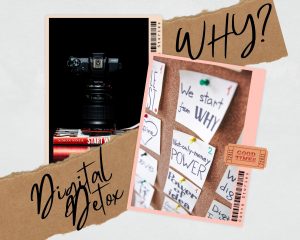Reasons for and effects of a digital detox among digital natives
3 minutes to read
What are the motives of young people to do a Digital Detox and what are the effects? Patricia Brüggemeier researched this question in her bachelor thesis at the University of Bremen and discovered some exciting points. Our Digital Detoxing team took a closer look at this research and wants to share Patricia’s findings with you.
Digital Detox Interview
First, who or what is a digital native?
Digital natives are the new generation that has grown up with the Internet. In this way, digital natives can be distinguished from digital immigrants, because digital immigrants have to relearn the digital world, while digital natives have grown up with the Internet.
What have been the reasons for a digital detox?
In this research, Digital Natives have done a Digital Detox. Initially, the question has been asked why young people have done a Digital Detox. The top four reasons for a Digital Detox among Digital Natives were:
- 25% Social pressure: Constantly comparing themselves; compulsion to communicate; self-expression; work pressure.
- 19% Time-wasting: Lost time with no real added value.
- 18% Desire for analog: need more analog instead of digital exchange.
- 9% Addiction: Feeling of loss of control as an addiction.
Other reasons have been mentioned, so also the desire for more concentration plays an important role (8%), senselessness (5%), self-protection (5%), change of values (1%), and the naming of concrete triggers (6%) were also mentioned. The desire was always to strengthen one’s perception of the outside world, achieve a better sense of self, and increase one’s own productivity in the process.
What were the effects on digital natives after they had done a Digital Detox?
The study showed that the longer a Digital Detox was carried out, the greater the screen renunciation after it was completed. Another very interesting finding was that the execution of a Digital Detox was mostly only connected to the cell phone, but not to the tablet, PC, or SmartTV. This clearly indicates that a spatial separation with the cell phone can be identified as much more difficult. Simple and mobile Internet use with the cell phone thus makes a Digital Detox the most difficult.
Participants in a Digital Detox were able to identify the following positive results in the aftermath:
- More time for themselves
- Comparing themselves less with others
- Less stress
- More conscious life in the real world
- Cell phone use changed afterward due to healthier social media use
- Better quality of life
Reduced sensory overload
However, the negative findings must be presented as well:
- FOMO, “fear of missing out” was present
- Difficult to reconcile with working life
- Loss of contact
- No longer able to meet new people via social networks
- The feeling of being excluded from something
auswirkungen eines digital detox
In summary, all participants had a positive feeling after the Digital Detox. The positive effects exceeded the negative effects. This study clearly shows that Digital Detox is not about giving up, rather it is about a healthy approach to the Internet. Use the Internet (almost unavoidable in the working world) and don’t let the Internet and its algorithms use you (loss of time and control on social media).

References:
- Beisch, Natalie; Koch, Wolfgang; Schäfer, Carmen (2019):
ARD/ZDF- Onlinestudie 2019: Mediale Internetnutzung und Video-on-Demand gewinnen weiter an Bedeutung. In: Media Perspektiven 9/2019, S.375-384. - Caron, André H.;Caronia, Letizia (2007): Moving Cultures. Mobile Communication in Everyday Life. Montreal & Kingston u. a.: McGill-Queen’s University Press.
- Gimpel, Henner; Lanzl, Julia; Manner-Romberg, Tobias; Nüske,
Niclas (2018): Digitaler Stress in Deutschland: Eine Befragung
von Erwerbstätigen zu Belastung und Beanspruchung durch Arbeit mit digitalen Technologien. URL: https://opus.bibliothek.uniaugsburg.de/opus4/frontdoor/deliver/index/docId/47627/file/p_fofoe_
WP_101_2018.pdf .